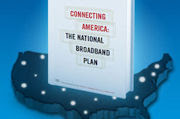 Are you ready to get behind the National Broadband Plan? You better be, because if tech savvy broadband users don’t push it through, there is little chance we'll see 100mbps Internet connections for 100 million or bridge the digital divide that today denies broadband to almost that same number of people.
Are you ready to get behind the National Broadband Plan? You better be, because if tech savvy broadband users don’t push it through, there is little chance we'll see 100mbps Internet connections for 100 million or bridge the digital divide that today denies broadband to almost that same number of people.There are certainly more critical issues facing America right now, including a slowly lifting recession, unemployment, a broken educational system, and the lack of quality healthcare for many of us. Compared to these things, improving broadband access and the other issues the plan tackles, will seem less than critical to many people.
Yet, the plan can also improve each the issues I've just named.
It is one of the best investments we could make, capable of dramatically expanding business, educational, and job opportunities. Instead of continuing to fall behind, the plan pushes the U.S. to at least keep up with what other industrialized nations--the countries we compete with economically--are doing.
Implementation of large parts of the plan is necessary to improve global competitiveness and create a better trained, more flexible workforce. It also can help improve the environment, health care, and national security.
Telecommunications in the U.S. has tended to be dominated by vendors, with little done to look after consumers or force a rapid pace of progress. As a result, the U.S. has a pretty lousy telecommunications infrastructure and the FCC is largely to blame. Rather than set policy, the Commission has tended, for decades, to be a lapdog to the industries it was supposed to be regulating.
Will the new National Broadband Plan be different?
We can hope so, but whether FCC Chairman Julius Genachowski will be able to shepherd his plan through his own five-member Commission, not to mention Congress, is an open question. This is, after all, a Democrat plan, and we've seen how well the Dems have lately done with their major initiatives.

It will be up to us--the tech savvy--to push this plan through. Without our voices, it won't happen. It's just that simple--and what does happen will be pro-business and likely anti-consumer. I'd say "just watch" but it's a fate we really must avoid.
It is not too soon to start telling people how important this plan is to each of us. Not too early to start rattling members of the House and Senate to support the plan. Is every part of it perfect? Of course not, but we are already behind much of the world and it may take a decade to catch-up, if we try really hard.
The Internet has become our town square, workplace, concert hall, stadium, shopping mall, library, and center of daily life. I am not sure all that is entirely positive, but there is no turning back. The Internet, in a short span of decades, has become how we live our lives.
At least, those of us lucky enough to have a good broadband experience. I wrote the other day that Broadband.gov clocked my AT&T DSL download speed at a tad more than 5mbps. My iPhone, connected to the same network, averaged about 3mbps.
That seems pretty fast, but the FCC plan aims at raising that speed to 100mbps, as Google works on its own plan to test 1gbps broadband connections in some lucky communities to be announced later this year.

The National Broadband Plan is a high water mark for the FCC, which is trying to set policy across a broad spectrum of telecommunications issues in both the private and public sectors. Genachowski has charted an ambitious course, but without public support, he will make little progress.
Please take a moment to at least read the part of the plan that interest you. It is available at broadband.gov, where you can also check the speed of your broadband connection.
The plan isn't perfect and is likely to be watered down and twisted by the political process. Still, the major points are right. It will be up to us to make today's plan tomorrow's reality.











0 Comments:
Post a Comment